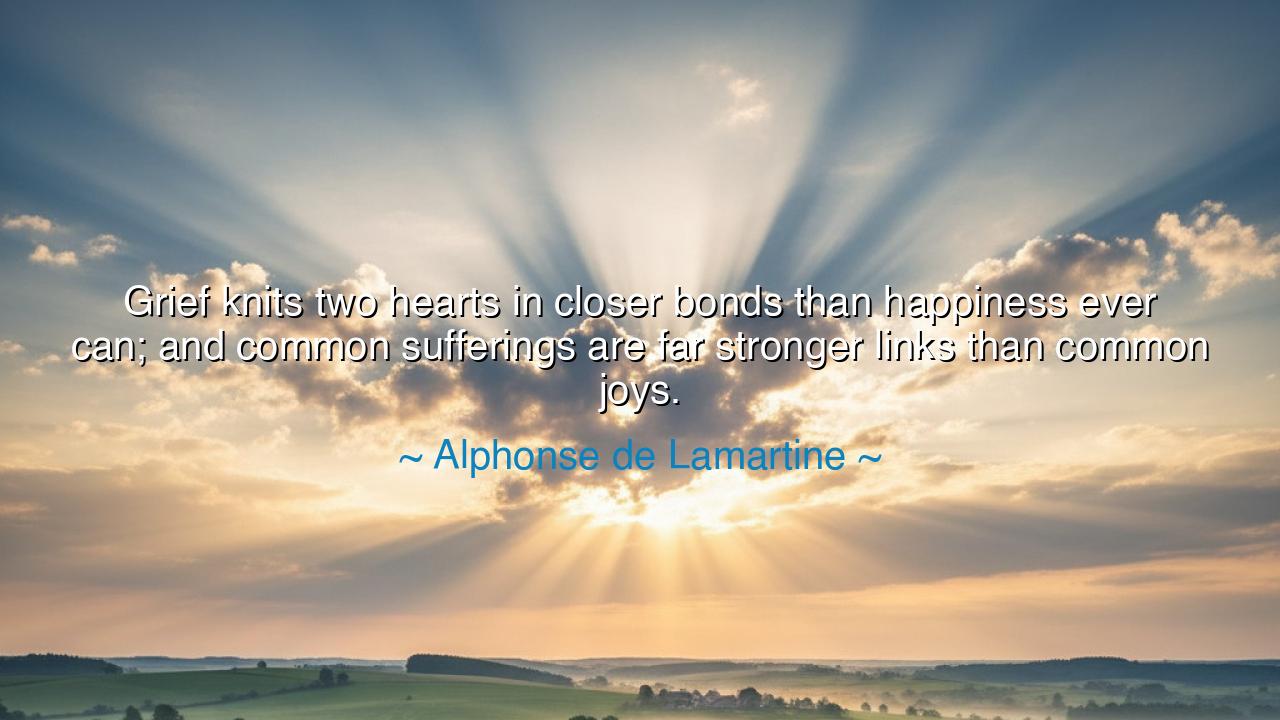
Grief knits two hearts in closer bonds than happiness ever can;
Grief knits two hearts in closer bonds than happiness ever can; and common sufferings are far stronger links than common joys.






The poet and statesman Alphonse de Lamartine, whose words flow like rivers of emotion through the landscape of human experience, once wrote: “Grief knits two hearts in closer bonds than happiness ever can; and common sufferings are far stronger links than common joys.” In this sentence, he captures one of the deepest mysteries of the human soul—that pain, though bitter, is a sacred thread that weaves hearts together more tightly than pleasure ever could. It is in the crucible of sorrow, not the gardens of delight, that love reveals its truest form. Happiness unites us in laughter, but grief unites us in truth.
The origin of these words lies in the heart of Lamartine’s own life—a man who loved deeply and suffered greatly. Born amid the upheavals of nineteenth-century France, he witnessed the revolutions that shook nations and the personal tragedies that break the human spirit. His writings, filled with the music of loss and longing, reflect a soul tempered by mourning. When he speaks of grief, he speaks not as an observer, but as one who has walked through its valley. He knew that sorrow, when shared, has the power to soften the heart and strip away the illusions that often keep us apart. It is pain that dissolves the walls of pride and self-interest, revealing the tender humanity we all share beneath.
In times of happiness, people gather like birds in summer—joyful, fleeting, and free. But when sorrow falls upon a life, only those whose hearts are bound by love will remain. It is then that the strength of bonds is tested. Lamartine reminds us that when two souls endure suffering together—whether through loss, hardship, or despair—they are bound not by circumstance, but by compassion. The fire of grief forges a deeper kind of kinship, one made of understanding rather than amusement, of sacrifice rather than pleasure. Where happiness may scatter with the changing winds, shared sorrow endures like stone beneath the waves.
History itself bears witness to this truth. Consider the soldiers who have endured the agonies of war side by side—the hunger, the fear, the mourning for fallen brothers. When the battle ends, their bond remains unbreakable. It is not victory that unites them, but the memory of shared pain. Or think of a mother and child who have struggled together through poverty and illness; their love, though shaped by hardship, becomes something eternal. So too with nations that rise from ruin, their people drawn together not by triumph, but by the shared suffering that taught them resilience and empathy. Grief, in its strange mercy, becomes a teacher of love more profound than joy could ever offer.
Lamartine’s insight is not meant to glorify pain, but to reveal its hidden grace. In suffering, the human heart becomes both fragile and divine—it learns to listen, to understand, to forgive. Those who have wept together no longer see each other as strangers, for in one another’s tears, they recognize their own reflection. The soul that has never grieved remains shallow, like still water that hides no depth. But the one that has suffered learns compassion, humility, and strength. Thus, common suffering does not merely link people—it refines them, making them capable of love that is patient, enduring, and real.
Yet, this truth also carries a sacred warning. Not all pain unites; some pain divides, if pride or bitterness rule the heart. To let grief bind us rather than break us, we must embrace it with openness and trust. When you suffer, do not close yourself in isolation, but reach toward others who suffer too. Share your pain, for in the sharing, it becomes lighter, and in the listening, it becomes holy. Happiness may be the melody of life, but grief is its harmony—rich, somber, and eternal. Only when we learn to accept both can our hearts truly sing.
Therefore, my child, take this teaching to heart: when sorrow enters your life, do not curse it as an enemy. Welcome it as a sculptor, shaping your soul into something finer. When you meet another who suffers, do not look away; sit beside them in silence, for that silence is a sacred bridge between souls. Remember that grief shared becomes love multiplied, and suffering borne together becomes the seed of peace. The world does not need more laughter without understanding—it needs compassion born of shared struggle, gentleness born of pain, and love deepened by tears.
And so, the words of Alphonse de Lamartine ring through the ages as both comfort and command: cherish the bonds forged by sorrow, for they are the truest kind. Let your heart not fear the dark, for it is there, in the quiet company of others who have suffered, that you will find what joy alone could never give—the profound communion of the human soul.






AAdministratorAdministrator
Welcome, honored guests. Please leave a comment, we will respond soon